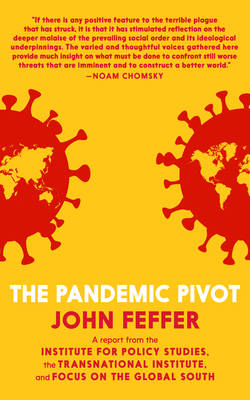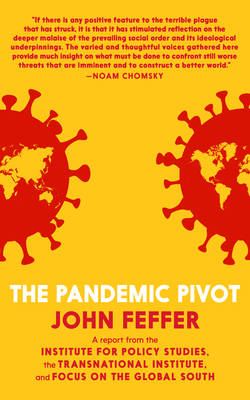
- Afhalen na 1 uur in een winkel met voorraad
- Gratis thuislevering in België vanaf € 30
- Ruim aanbod met 7 miljoen producten
- Afhalen na 1 uur in een winkel met voorraad
- Gratis thuislevering in België vanaf € 30
- Ruim aanbod met 7 miljoen producten
Zoeken
Omschrijving
Experts from the frontlines of global policy tackle the implications of Covid-19 Transformative change can come out of the COVID-19 crisis, which has exposed everything that's wrong with decades of the world's governments betting on militarism, competition and wealth creation. A return to sanity and humane governance is still possible. We need a pandemic pivot.
Both a sobering analysis of the present moment and a hopeful cry on behalf of the power inherent in a global, people-oriented response to the pandemic and the societal breakdown that led to it, The Pandemic Pivot offers insight and an actionable framework for what Cindy Wiesner calls "a just transition to a regenerative, anti-racist, feminist economy." As The Pandemic Pivot demonstrates, equity and cooperation aren't just nice principles, they're survival strategies.
In June and July of 2020, the Institute for Policy Studies invited 68 of the world's leading thinkers and activists to participate in eight in-depth discussions. Their task: to assess the implications of COVID-19 for key global issues as well as the potential for transformative change coming out of this crisis. They discussed a Green recovery, the global economy, coronavirus authoritarianism, migrants and refugees, budget priorities, the global ceasefire, international civil society, and multilateral cooperation. This report by John Feffer from the frontlines of global policy stands in stark contrast to the reality in the world today. Reading it amounts to a return to sanity and humane governance, and illuminates the way forward that is still possible if we begin soon.
Participants included EcoEquity Executive Director and author Tom Athanasiou; Nigerian architect, environmental activist and author Nnimmo Bassey; Focus on the Global South co-founder and author Walden Bello; CODEPINK and Global Exchange co-founder and acclaimed peace activist Medea Benjamin; AFL-CIO International Department director Cathy Feingold; Indian columnist and International Development Economics Associates executive secretary Jayati Ghosh; author and arms trade expert Bill Hartung; Peace and World Security Studies director and noted author Michael Klare; Quincy Institute for Responsible Statecraft CEO and noted author Lora Lumpe; Yale professor and distinguished author on human rights and peace studies Samuel Moyn; Geneva-based human rights advocate Aziz Muhamat; acclaimed political philosopher Jan-Werner Muller; African storyteller and writer Coumba Toure--to name just a few, representing organizations and regions from across the globe.
Both a sobering analysis of the present moment and a hopeful cry on behalf of the power inherent in a global, people-oriented response to the pandemic and the societal breakdown that led to it, The Pandemic Pivot offers insight and an actionable framework for what Cindy Wiesner calls "a just transition to a regenerative, anti-racist, feminist economy." As The Pandemic Pivot demonstrates, equity and cooperation aren't just nice principles, they're survival strategies.
In June and July of 2020, the Institute for Policy Studies invited 68 of the world's leading thinkers and activists to participate in eight in-depth discussions. Their task: to assess the implications of COVID-19 for key global issues as well as the potential for transformative change coming out of this crisis. They discussed a Green recovery, the global economy, coronavirus authoritarianism, migrants and refugees, budget priorities, the global ceasefire, international civil society, and multilateral cooperation. This report by John Feffer from the frontlines of global policy stands in stark contrast to the reality in the world today. Reading it amounts to a return to sanity and humane governance, and illuminates the way forward that is still possible if we begin soon.
Participants included EcoEquity Executive Director and author Tom Athanasiou; Nigerian architect, environmental activist and author Nnimmo Bassey; Focus on the Global South co-founder and author Walden Bello; CODEPINK and Global Exchange co-founder and acclaimed peace activist Medea Benjamin; AFL-CIO International Department director Cathy Feingold; Indian columnist and International Development Economics Associates executive secretary Jayati Ghosh; author and arms trade expert Bill Hartung; Peace and World Security Studies director and noted author Michael Klare; Quincy Institute for Responsible Statecraft CEO and noted author Lora Lumpe; Yale professor and distinguished author on human rights and peace studies Samuel Moyn; Geneva-based human rights advocate Aziz Muhamat; acclaimed political philosopher Jan-Werner Muller; African storyteller and writer Coumba Toure--to name just a few, representing organizations and regions from across the globe.
Specificaties
Betrokkenen
- Auteur(s):
- Uitgeverij:
Inhoud
- Aantal bladzijden:
- 240
- Taal:
- Engels
Eigenschappen
- Productcode (EAN):
- 9781644210932
- Verschijningsdatum:
- 5/01/2021
- Uitvoering:
- Paperback
- Formaat:
- Trade paperback (VS)
- Afmetingen:
- 140 mm x 208 mm
- Gewicht:
- 272 g

Alleen bij Standaard Boekhandel
+ 47 punten op je klantenkaart van Standaard Boekhandel
Beoordelingen
We publiceren alleen reviews die voldoen aan de voorwaarden voor reviews. Bekijk onze voorwaarden voor reviews.











